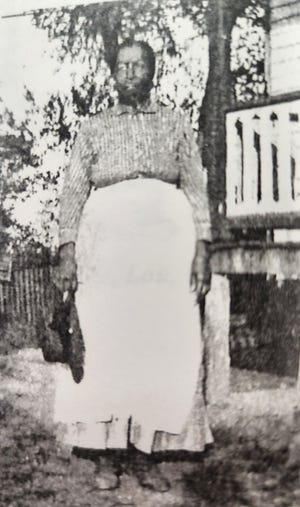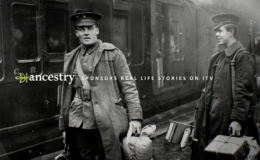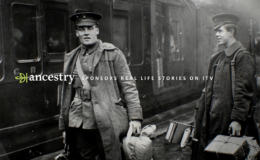
D. Ray Smith
In this second and final part of the Julia Daniel story, Benita Albert brings us a story she first learned of when researching her story on Molly Brown, an Oak Ridge Schools graduate. The history goes back to the days of plantations prior to the Civil War. The coming Tri-County African American Cultural Museum in Oliver Springs will bring this story and others like it to life for African Americans and others interested in the area’s earlier history as well.Now continue to enjoy this adventure back into the history of our area.
***
Julia Hopper Daniel is on a quest to uncover history and to share the legacy of the African American people from the Tennessee counties of Roane, Morgan, and Anderson. Her dream is soon to be realized with the establishment of the Tri-County African American Cultural Museum in Oliver Springs. Fittingly, the town of Oliver Springs contains parts of all three counties listed above.
The Hopper family counts seven generations of extended family members who have called the Oliver Springs area their home.
I asked Julia what motivated her to take on such an ambitious project. She answered, “I am constantly reminded of the old African proverb: ‘Until the lion tells his side of the story, the tale of the hunt will always glorify the hunter’.” She decried the paucity of local African American history. She has hopes that the museum could serve not only as a documented repository of the African American culture and contributions, but also as a dynamic environment in which further information resources develop to extend and enrich the history.
As a previously published part of her story related, Julia has researched family and area history from oral stories and print records to modern day aids such as internet genealogical searches and DNA ancestry kits. She has completed three books documenting her ancestral families’ legacies, as well as contributed to numerous historical documents. Julia uncovered the enslavement origin of the early life of her great-great-grandmother Adeline Staples Crozier, and she has celebrated the accomplishments and successes of Adeline’s progeny.

Julia’s appreciation for the one-room schoolhouse education she received in the Oliver Springs Colored School (OSCS) led her to further advocacy. Mayme Carmichael taught at least three generations of families during her tenure at OSCS.
Julia said, “Miss Mayme pushed her students to have a bulldog tenacity, to stick to any task until it was successfully completed.” Her teaching mantra was etched on Julia’s psyche.
She has founded and served as president of the Mayme Carmichael School Organization. She solicited the support of Oliver Springs Mayor Omer Cox and other city officials, legal aid from the honorable Joseph Van Hook (lawyer and advisor), and volunteer services and donations from many interested partners. Her efforts have resulted in The Carmichael Park, a public gathering place on the site of the OSCS grounds.
Julia’s leadership and service have been manifested in many ways. In a 2012 speech she delivered to the Women’s Ministry of the Knoxville District Baptist Association, Julia opined: “The church and school have long been the strongest institutions for Black families.”
Julia and her mother, Nannie Smith Hopper, worked with fellow members of the Little Leaf Baptist Church to complete a commemorative quilt. Their stitchery art skills created the “Coal Miners’ Quilt” honoring the Oliver Springs area coal miners, over 60 of whom were Black. In addition, Julia has chronicled quilt patterns depicting historical and biblical stories as an African American art form.
In 1855, Julia’s Great-Great-Grandmother Adeline (age 10) was brought to Winters Gap (now Oliver Springs) to work on the plantation of William Staples. She and her four-year-old son, Jack, were freed from slavery in February 1865, two years after Abraham Lincoln’s Emancipation Proclamation and just three months before the official end of the Civil War on May 25, 1865. Adeline and her son lived out the rest of their lies in the area, and Adeline became one of the charter members of Little Leaf Baptist Church.

Julia chose to honor Adeline by portraying her and conducting tours during the 2012 October Sky Festival in Oliver Springs. This portrayal was described by Julia: “The main point about Adeline and her family is that education, serving God, and giving back to your community and country are very important.”
Julia’s additional activities include attending family reunions from numerous ancestral branches. She wrote of her passion: “I am from a family where knowing your history is very important. My mother (originally from Jefferson City, Tennessee) had a family gathering as early as 1945. I have researched family history in the Dandridge, TN old court room, and my family has traced our history back to 1790.”
Julia has shared her research skills via numerous speaking engagements. She has shared her own family search experiences, and she has offered advice on conducting genealogical searches. In a presentation she gave at a 1996 Blacks In Government training conference, she cautioned the attendees that there would be difficulties.
Her list of difficult issues included: no legal records, missing surnames, identifying slave plantations, and mixed ancestry. She also offered tips on sources worth investigating: your own memory, home/personal papers and records, church records, cemeteries, interviews, newspapers (births, marriages, and obituaries) and letter writing requests.
Nowadays, Julia would add internet searches and DNA test results to the above tips. And I would add: Be like Julia, share your findings, get involved with local historical societies and special events, and be as tenacious as her beloved teacher Mayme Carmichael taught her to be. “Stick to any task until it is completed.”
Julia recognizes that her dreams of completion, of doing justice to the story of the important contributions of the African American people in the local area, depend on a village. That village has relied heavily on older generational memories and oral histories; on city, county, and state government officials’ cooperation; on dedicated researchers; and on volunteer workers and donor support.
Current donations to support the Tri-County African American Cultural Museum may be through Julia Daniel, president of the Mayme Carmichael School Organization Inc., P.O. Box 516, Oliver Springs, TN. Donations by check should be written to MCSO, Inc., a 501(c)3 nonprofit organization.
Considering the site of the museum and the problematic space and traffic concerns of locating in Carmichael Park, an easier public access site has been secured. The Tri-County African American Museum will be housed in space purchased in the former Tri-County Mall on Highway 61. The grand opening is tentatively planned for Black History month, February 2023.
Julia mentioned her dreams of young people visiting the museum and becoming curious about their own family heritage. She would love to see history extended and enriched through their inquisitive and creative minds. She wants museum attendees to see the contributions of previous generations of farmers, coal miners, washwomen, and other area workers, and of the broad ranging accomplishments of their descendants. She smiled when mentioning just a few from her family and local area neighbors who have gone on to excel in careers in medicine, education, law, science and engineering, government service, and military service, including one of the famed Tuskegee Airmen.
“The Tri-County African American Cultural Museum will educate, inspire, and challenge everyone who visits to make a difference and to contribute to society,” per Julia’s hopes and dreams. “The museum will explore the past adversities of slavery, educational access, and economic opportunities. Also, museum exhibits will honor the accomplishments and contributions across at least eight generations of local African American citizens and their extended families.”
Julia concluded her comments by passionately stating, “Education and faith have paved the ‘Road to Freedom’ for African Americans.”Julia was asked to describe herself in one word for a questionnaire/interview of the honorees of the 2015 YWCA Tribute to Women in East Tennessee.
She replied, “Overcomer.”
Julia and her husband of 55 years, Julian Daniel, have raised two children, Mark, and Michele, and now count themselves blessed with five grandchildren. Julia began a 35-year career in government service at Oak Ridge Associated Universities, transferring to the Atomic Energy Commission, and retiring from the U.S. Department of Energy in Information Services. This “overcoming” woman managed a career and nurtured her family while also completing an undergraduate degree in business administration followed by an MBA/accounting graduate degree.
When Julia was asked to explain “overcoming” in her personal experience, she said: “I am someone who has sought to overcome adversity through education, both for myself and others.” The “others” to whom she refers includes both her adult children who are college graduates and to scholarship recipients she has known through her leadership on the Concern for Students Committee in her church. The committee’s Edgar Fritz Memorial Scholarship Fund has provided higher education financial support to more than 30 students.
The term “overcoming” is based on the belief that education opens doors to success, something many of Julia’s ancestors found difficult to access. She strongly identifies with the words of famed polymath Albert Schweitzer: “One who gains strength by overcoming obstacles possesses the only strength which can overcome adversity.”
Julia retired from government service in 2003. She served as a charter member of Federal Employed Women, as well as a charter member of Blacks In Government. She honed research and leadership skills in her career that she now applies to her advocacy for archiving and sharing stories of the contributions of the African American culture.
The Tri-County African American Cultural Museum is a gift to the local community and to successive generations. Julia defines a next important step as getting the younger generation involved. In a speech delivered to Oliver Springs High School students, Julia gave the following advice: “Never be bitter about the past or events that happened in your life. All my bad news has been outweighed by my good news. Daily ask yourself: Is a single heart rejoicing over what you did or said?”

The planned museum offers an opportunity to get involved, to educate ourselves on a part of history too long neglected, and to take away an appreciation for the contributions of African Americans in our region. Thanks to Julia Hopper Daniel’s passionate endeavors, we can look forward to hearing the “lion’s tale,” to furthering an appreciation of “overcoming histories,” and to rejoicing in the gift of greater understanding and kinship.
***
Thank you, Benita, you have certainly enlightened us on a portion of our history that has not been well told. The upcoming museum, scheduled to open in February 2023, will be a welcome addition to the museums in our area. I look forward to visiting there as soon as it opens.















